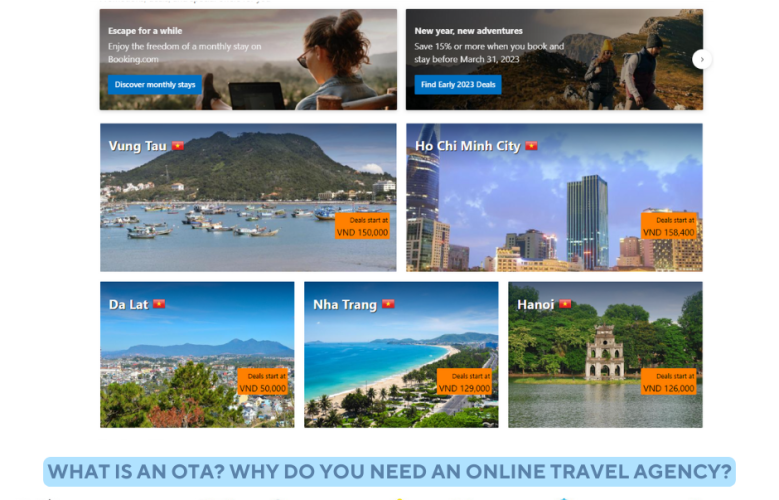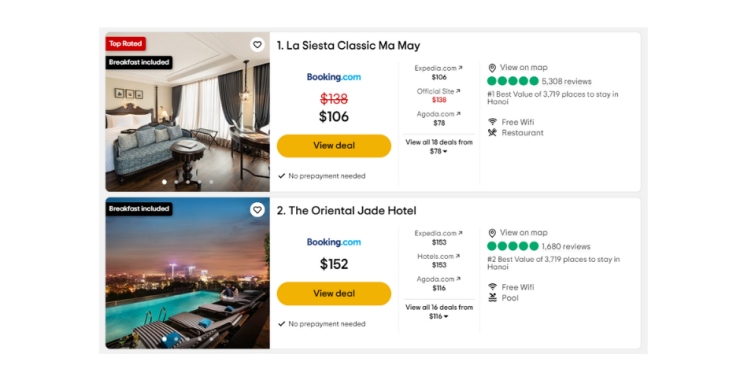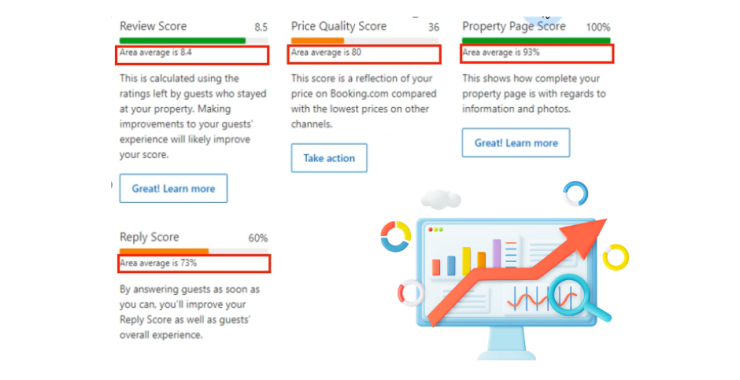What is an OTA? Why do you need an Online Travel Agency?
An online travel agency (OTA) is a web-based marketplace that allows consumers to research and book travel products and services, including hotels, flights, cars, tours, cruises, activities and more, directly with travel suppliers. Every day, millions of travelers around the world use OTAs to plan leisure and business travel. OTAs provide access to your potential guests in locations and at volumes that would be difficult for you to access through your own marketing efforts. Additionally, OTAs provide market insights and tools for targeting travelers, securing and processing bookings, communicating with guests and managing reviews
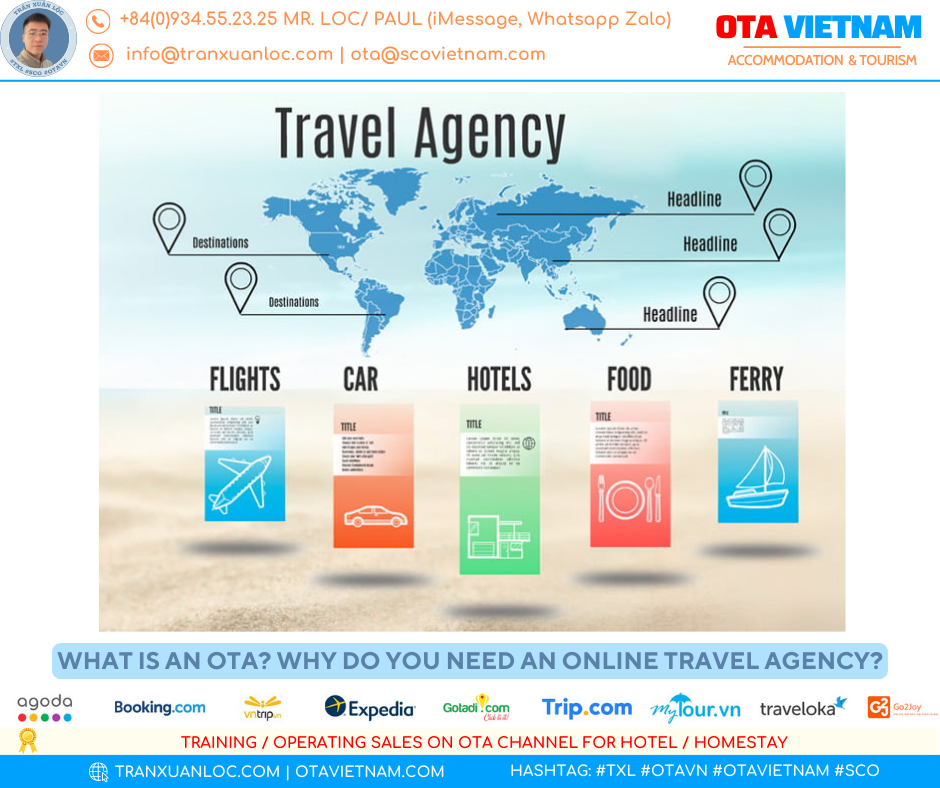
Eng Otavn Otavietnam 940x788px What I An Ota Why Do You Need An Online Travel Agency
Advantages of using OTA channel
– The service provider’s brand is always widely promoted on Internet tools such as search engines, keyword ads, facebook ads, zalo…
– In addition to labor/wage costs, the Registration for OTA channels is free
– Customers can easily order services through applications and websites with optimized user experience: friendly interface, easy to use, manipulation, processing time fast…
– Customers enjoy additional policies of OTA agents such as giving direct discount vouchers, accumulating points, free when buying a lot, preferential treatment with many accompanying services…
– OTA admin pages often have a section Visitor statistics help managers monitor and statistics visitors and offer appropriate pricing strategies or target markets.
Why work with an Online Travel Agency (OTA)?
OTAs are increasingly popular. In fact, travelers today use OTAs 50% more than hotel websites to compare leisure travel options. And that means OTAs can play an important part in your distribution strategy.
Online marketing investments you don’t have to make
Every year OTAs spend millions of dollars attracting consumers from around the world to their online travel marketplaces. Their investment in on online and tv advertising, billboards and sponsorships, social media and other marketing channels helps hotels to engage hard-to-reach travelers they couldn’t afford to reach otherwise. OTAs give you a low risk opportunity to grow your business, especially if you have limited marketing funds.
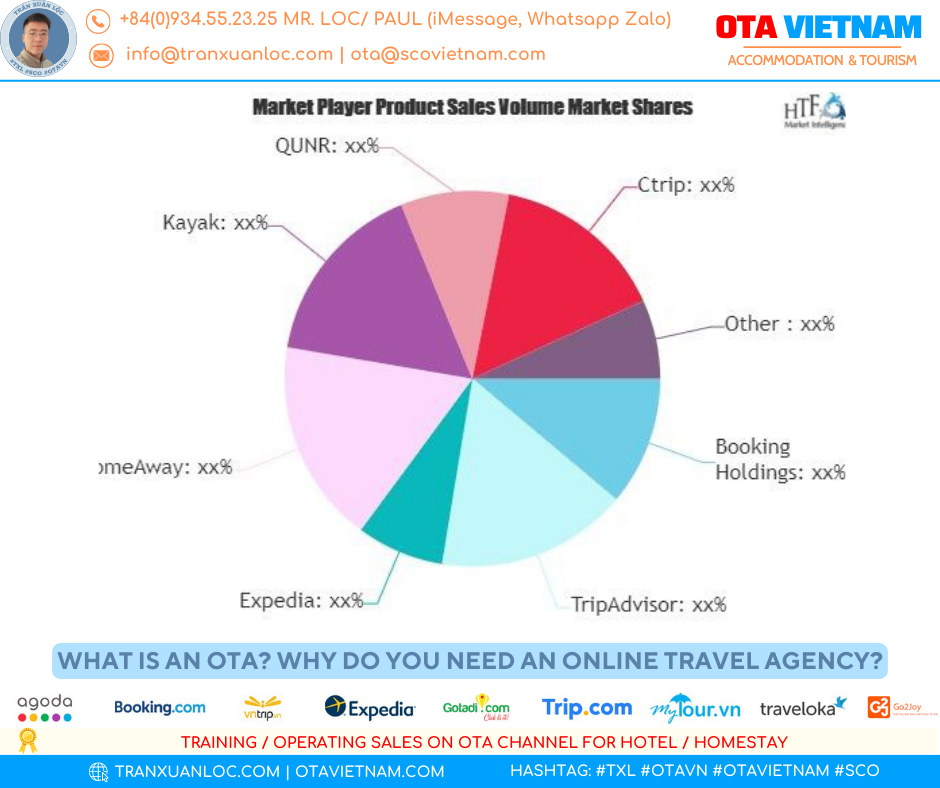
Eng Otavn Otavietnam 940x788px What I An Ota Why Do You Need An Online Travel Agency2
How do hotels work with OTAs?
Hotels of all sizes–including bed & breakfasts, inns and ryokans–sign contracts to list their properties on an OTA. There are no upfront fees to list rooms in the marketplace. OTAs make money only when rooms are booked, collecting a percentage of the total value of each secured reservation.
The OTA provides opportunities to showcase rooms and properties through amenity descriptions, photos, nearby points of interests and more. Listings are displayed to travelers searching for places to stay in your destination. If they use filters to narrow their search—e.g. only looking for pools, free Wi-Fi, or air conditioning—the OTA will align travel criteria with the detail provided by the hotel, displaying the properties that match best.
The OTA provides a secure booking platform and is the traveler’s main point of contact for booking amendments and cancellations. At no cost, OTAs provide a variety of tools—from real-time access to market data to tools for managing reviews—to help their partners be successful.
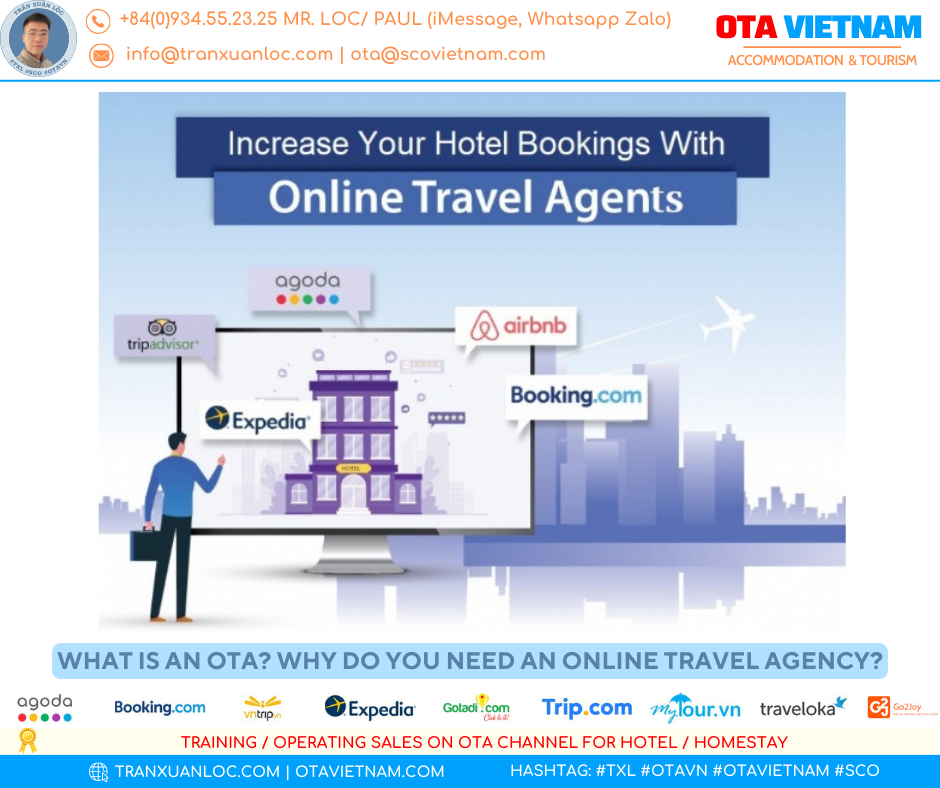
Eng Otavn Otavietnam 940x788px What I An Ota Why Do You Need An Online Travel Agency3
Increased ability to target high-value guests
Through their listing tools and marketing programs, many OTAs can help hotels target guests who will be delighted with their stay and drive profitable growth. Possibilities range from packaging rooms with flights to attract guests who tend to cancel less, to targeting business travelers, budget or luxury guests, families or those from specific regions. Marketing programs can help you achieve specific business goals, including maintaining high average daily rates (ADRs), driving longer stays to reduce costs or capture last-minute bookings. Best of all, when you attract the right guests for your property, you increase the likelihood of positive, glowing reviews.
Access to rich tools, analytics and insights
OTAs give you free access to market data, competitive insights, traveler preferences and tools that otherwise can be costly to acquire on your own. Most will offer easy-to-use analytics to help you better understand your year-over-year performance and how you compare to like properties in your market. Based on their data and the booking trends in their marketplace, they may make suggestions to help you improve your results and offer tips and resources to support your decision making.
Dedicated support teams
Many OTAs support their partners’ success through regionally based account teams. These individuals have extensive market knowledge, can share insight on regional trends and advise on tactics that will help drive business success. When partners have issues or concerns, support teams and help content is available. Additionally, most OTAs provide travelers with service when they experience challenges before, during and after a trip.
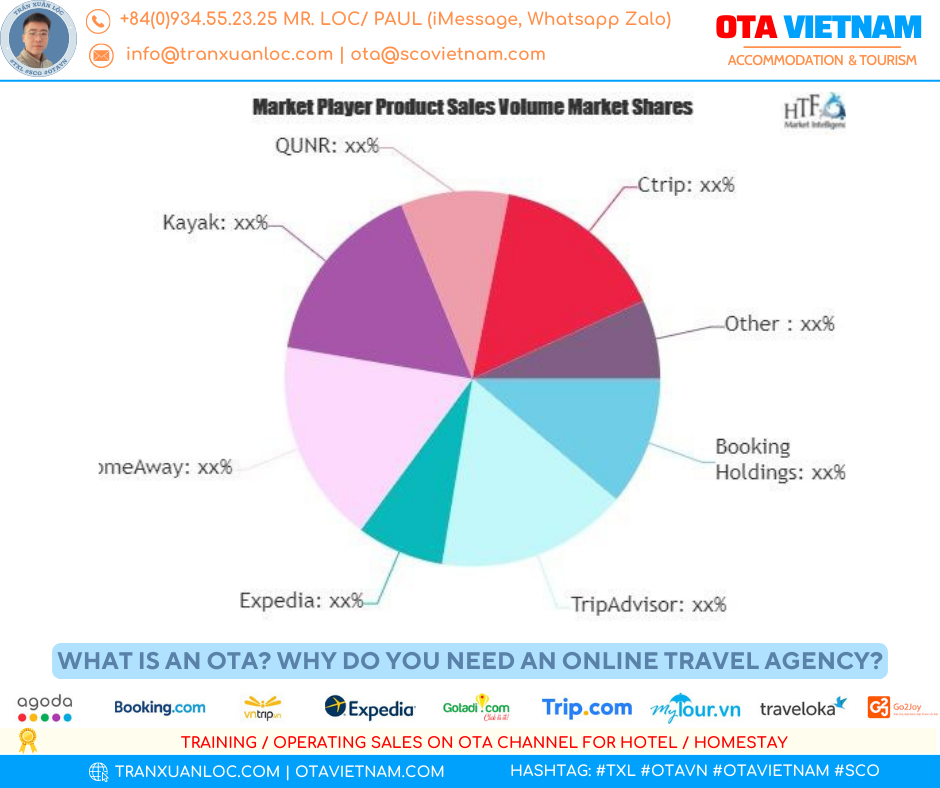
Eng Otavn Otavietnam 940x788px What I An Ota Why Do You Need An Online Travel Agency2
Greater visibility for your own website
Evidence shows that being listed on an OTA can bring more traffic to your property’s own website, because consumers often use OTAs for their search before booking directly. This is known as “The Billboard Effect”.
A 2011 study which looked at consumers’ online pre-purchase behavior found that around 75% of people who made direct reservations with a major hotel brand had visited an OTA website before booking directly with the hotel. Another report in 2017 showed that the “Billboard Effect” still occurs, as many people still visit an OTA prior to booking direct.
What should you consider when choosing an Online Travel Agency (OTA)?
There are many OTAs to choose from, and they come in all shapes and sizes, from large, global OTAs to local and niche-interest ones. You should known the most OTA channel in your country before starting selling accomadation on OTA.
Who is their audience?
Many OTAs target specific audiences. Think about the region and segment you want to target and whether an OTA caters to this audience. For example, if you own a small B&B mainly catering to families, you would want to avoid signing up with an OTA which mainly targets business travelers.
You can find out more about an OTA’s target audience by looking at the properties listed on their website, or by simply asking a representative at the OTA before signing up.
What is the user experience for guests?
Take a look at their traveler-facing websites (such as expedia.com) and get a feel for what the searching, browsing and booking experience is like for your potential guests.
If you find the experience difficult or frustrating, it’s likely other travelers will too. Frustrated travelers are likely to look elsewhere to make their bookings.
What features do they offer to partners?
Every OTA has a different set of tools and analytics to help with revenue management, pricing decisions, and promotion of your property. Some larger OTAs have whole teams dedicated to creating these tools, so it is worth assessing which OTAs offer the most useful tools for you.
Another important thing to consider is whether an OTA integrates with your channel manager. This integration will be important to your distribution strategy, helping smooth management of bookings and eliminating the risk of overbooking errors.
